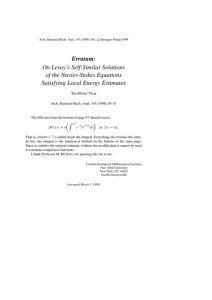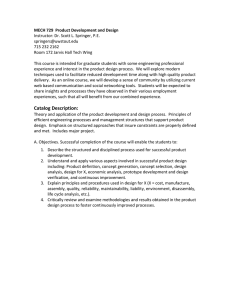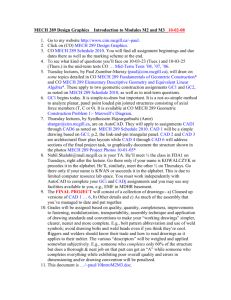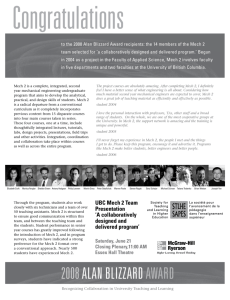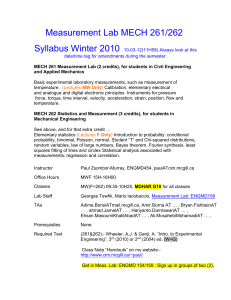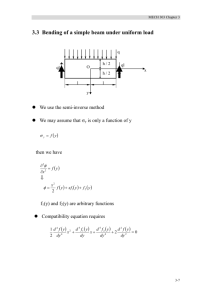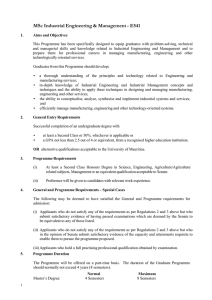FACULTY OF ENGINEERING amendments in bold and italics
advertisement
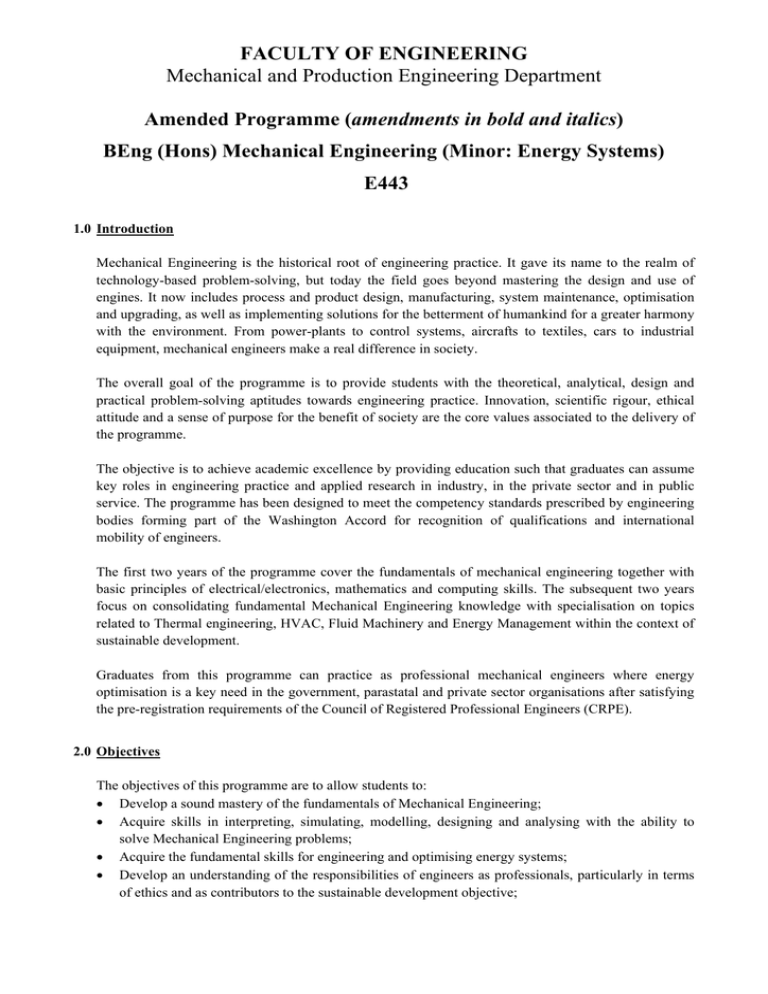
FACULTY OF ENGINEERING Mechanical and Production Engineering Department Amended Programme (amendments in bold and italics) BEng (Hons) Mechanical Engineering (Minor: Energy Systems) E443 1.0 Introduction Mechanical Engineering is the historical root of engineering practice. It gave its name to the realm of technology-based problem-solving, but today the field goes beyond mastering the design and use of engines. It now includes process and product design, manufacturing, system maintenance, optimisation and upgrading, as well as implementing solutions for the betterment of humankind for a greater harmony with the environment. From power-plants to control systems, aircrafts to textiles, cars to industrial equipment, mechanical engineers make a real difference in society. The overall goal of the programme is to provide students with the theoretical, analytical, design and practical problem-solving aptitudes towards engineering practice. Innovation, scientific rigour, ethical attitude and a sense of purpose for the benefit of society are the core values associated to the delivery of the programme. The objective is to achieve academic excellence by providing education such that graduates can assume key roles in engineering practice and applied research in industry, in the private sector and in public service. The programme has been designed to meet the competency standards prescribed by engineering bodies forming part of the Washington Accord for recognition of qualifications and international mobility of engineers. The first two years of the programme cover the fundamentals of mechanical engineering together with basic principles of electrical/electronics, mathematics and computing skills. The subsequent two years focus on consolidating fundamental Mechanical Engineering knowledge with specialisation on topics related to Thermal engineering, HVAC, Fluid Machinery and Energy Management within the context of sustainable development. Graduates from this programme can practice as professional mechanical engineers where energy optimisation is a key need in the government, parastatal and private sector organisations after satisfying the pre-registration requirements of the Council of Registered Professional Engineers (CRPE). 2.0 Objectives The objectives of this programme are to allow students to: • Develop a sound mastery of the fundamentals of Mechanical Engineering; • Acquire skills in interpreting, simulating, modelling, designing and analysing with the ability to solve Mechanical Engineering problems; • Acquire the fundamental skills for engineering and optimising energy systems; • Develop an understanding of the responsibilities of engineers as professionals, particularly in terms of ethics and as contributors to the sustainable development objective; • Develop a critical mind, independent learning ability and communication, teamwork, management and leadership skills essential in Mechanical Engineering practice. 3.0 General Entry Requirements As per General Entry Requirements for admission to the University of Mauritius for Undergraduate Degrees 4.0 Programme Requirements 2 GCE ‘A’ Level Passes in Mathematics and one of the following subjects: Physics, Physics with Chemistry, Design & Technology 5.0 Minimum Requirements for Degree Award For the award of the degree, the following should be met: 1. Successful completion of 147 credits as per the programme structure; 2. Satisfactory attendance to industry seminars organised by the department; 3. Satisfactory completion of modules assessed through coursework only; 4. Satisfactory completion of industrial placements; 5. Satisfactory performance in each of the Exit Level Outcomes (ELOs) specified against modules in the module specification sheet (MSS). To complete the programme of studies, students are required to perform satisfactorily in the following 10 ELOs. 1. ELO 1: Problem solving 2. ELO 2: Application of scientific and engineering knowledge 3. ELO 3: Engineering design 4. ELO 4: Investigations, experiments and data analysis 5. ELO 5: Engineering methods, skills and tools, including Information Technology 6. ELO 6: Professional and technical communication 7. ELO 7: Impact of engineering activity 8. ELO 8: Individual, team and multidisciplinary working 9. ELO 9: Independent learning ability 10. ELO 10: Engineering Professionalism Students will be allowed to proceed to Level 3 subject to having a minimum CPA of 45.0 at the end of level 2. 6.0 Programme Duration Degree: Normal Maximum 4 years 7 years 2 7.0 Credits per Year Minimum 5, Maximum 48 subject to Regulation 6 above. 8.0 Pre-Requisite Modules (PR) A student will be allowed to follow module y of which module x is a pre-requisite (PR) provided s/he has passed in module x. 9.0 Assessment The assessment mode for each module will be based on one or a combination of the following: • • • • • • Examination Continuous assessment Mini projects Practical and other reports Presentations Attendance to seminars The detailed assessment mode for each module will be provided in the Module Specification Sheet (MSS) for the respective module. 10.0 Exit Points A student whose registration is on the point of being terminated, as a result of having her/his CPA <40.0 at the end of an academic year and who has already repeated one year of study: Minimum Requirements for Diploma Award Students who have a CPA of less than 45.0 at the end of level 2 shall be required to repeat the entire academic year or exit with a Diploma in Mechanical Engineering provided the following conditions are met: MODULES CREDITS Modules from Levels 1 & 2 60 Diploma Project MECH 2000 6 TOTAL 66 Students are allowed to repeat only once over the entire duration of the Programme of Studies. A student may also opt for a Diploma in Mechanical Engineering provided s/he satisfies the above requirements. The Diploma project would normally be lab based, of 8 weeks duration, for an input of at least 90 hours. 3 11.0 Programme Plan – BEng (Hons) Mechanical Engineering (Minor:Energy Systems) – E443 Explanatory Note Self-Development (SD) This refers to directly supervised work in terms of hours/week. It includes practicals, tutorials, seminars, visits, mini-projects, oriented-discussion, coached group-work, presentations and other structured activities associated to enhancing the engineering application abilities and professional and personal attributes of the students. Such supervised work is included in the time-table. Each 30 hours of SD is equivalent to one credit unit. Continuous Assessment (CA) Modules with continuous assessment do not have formal examinations but students are required to satisfactorily complete these modules to graduate. The mode of assessment for these modules is included in the detailed programme structure. Accreditation Reference The reference document for the purpose of accreditation of this programme is from the Engineering Council South Africa (ECSA). 4 Outline Programme Structure Level 1 Contact Hours No Module Title Module Code L SD No of credits 1 Electrical & Electronics Engineering ELEC 1012Y 2 1 5 2 Industry Seminar 3 Engineering Maths I Remarks MECH 0 0 0 MECH 1010Y 3 0 6 1016Y Continuous Assessment only 4 Professional Skills for Mechanical Engineering MECH 1011Y 1 1 3 Continuous Assessment only 5 Engineering Graphics and CAD MECH 1012Y 2 1 5 Continuous Assessment only 6 Thermodynamics MECH 1013Y 2 1 5 Mechanics of Materials 1 MECH 1014Y 2 Workshop Technology MECH 1015Y 2 7 8 1 5 1 5 TOTAL 14 Abbreviations: L: Lecture, SD: Self Development 5 6 34 Level 2 Contact Hours No Module Title Module Code L SD No of credits Remarks Pre‐Requisite (PR) 1 Electrical Machinery and Measurement ELEC 2012Y 2 1 5 2 Programming Techniques for Mechanical Engineers ELEC 2013Y 1.5 1 4 3 4 Engineering Maths II Thermal Engineering 1 Pre‐Requisite (PR) MECH 2010Y 3 0 6 MECH 1010Y Engineering Maths I Pre‐Requisite (PR) MECH 2011Y 2 1 5 MECH 1013Y Thermodynamic s Pre‐Requisite (PR) 5 Mechanics of Materials II MECH 2012Y 2 1 5 6 Materials & Production Engineering MECH 2013Y 2 1 5 Fluid Mechanics MECH 2014Y 2 7 ELEC 1012Y Electrical and Electronics Engineering MECH 1014Y Mechanics of Materials I 1 5 TOTAL 14.5 Abbreviations: L: Lecture, SD: Self Development 6 6 35 Level 3 Contact Hours No Module Title 1 Maintenance and Reliability Engineering 2 Control Engineering Module Code MECH 3013Y L SD No of credits 1.5 0.5 3.5 Remarks Pre‐Requisite (PR) MECH 3008Y 2 1 5 MECH 2010Y Engineering Maths II Pre‐Requisite (PR) 3 Engineering Maths III MECH 3009Y 3 0 6 4 Mechanics of Machines MECH 3010Y 2 1 5 MECH 2010Y Engineering Maths II Pre‐Requisite (PR) 5 Metrology & Surface Technology MECH 3011Y 2 1 5 6 Engineering Design MECH 3012Y 2 2 6 7 Industrial Placement MECH 3100 MECH 2013Y Materials & Production Engineering Continuous Assessment only Continuous Assessment only Pre‐Requisite (PR) 8 Thermal Engineering II MECH 3014Y 2 1 5 MECH 2011Y Thermal Engineering I 9 Pneumatics and Hydraulics MECH 3015Y 2 1 5 7 Contact Hours No Module Title Module Code TOTAL Abbreviations: L: Lecture, SD: Self Development 8 L SD No of credits 16.5 7.5 40.5 Remarks Level 4 Contact Hours Module Code L SD No of credits Remarks Engineers in Society ENGG 4101 2 0 2 Continuous Assessment only Engineering Project MECH 4000 1 No Module Title 1 2 3 4 5 6 7 12 Project Appraisal Techniques MECH 4013Y 1.5 Engineering Management MECH 4016Y 2 HVAC and Refrigeration Sustainable Energy Management Fluid Machinery 4 0.5 4.5 Pre‐Requisite (PR) MECH 4017Y 2 1 5 MECH 1013Y Thermodynamic s Pre‐Requisite (PR) MECH 4018Y 2 MECH 4006Y TOTAL Abbreviations: L: Lecture, SD: Self Development Total Credits: 147 9 1 5 2 1 5 11.5 4.5 37.5 MECH 1013Y Thermodynamic s Pre‐Requisite (PR) MECH 2014Y Fluid Mechanics
